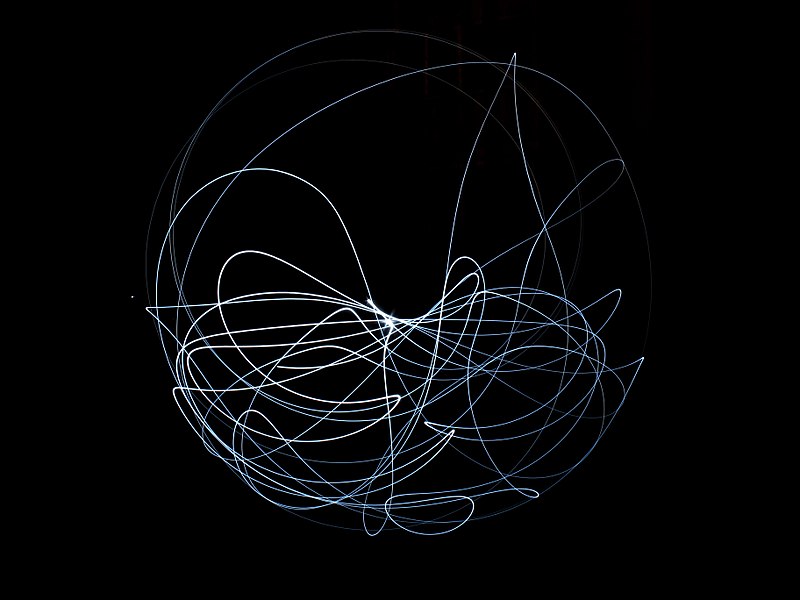The Philosophy of Chaos Theory
One of the most important discoveries in scientific history was that of Chaos Theory.
The theory comes from the recognition that "small differences in initial conditions, such as those due to rounding errors in numerical computation, yield widely diverging outcomes for such dynamical systems, rendering long-term prediction of their behavior impossible in general."
This is summarized by Edward Lorenz as:
"Chaos: When the present determines the future, but the approximate present does not approximately determine the future."
One of the most common examples of this is found in weather modeling. While we can accurately model weather, to a degree, within short timespans, with increasing time from the original prediction comes increasing error. This means much more than that we cannot accurately model weather systems for extended periods of time.
Chaos Theory Application
The most immediate application of chaos theory is our lives.
When we peer into the future and envision events taking place, we are forming an approximate prediction of what the outcome will be. Just like with weather, we can accurately predict the future to a degree. For example, I predict that I will take a shower after I post this article. I can say this with confidence for two reasons:
- I was very well-informed prior to forming my prediction.
- The distance into the future is sufficiently close.
The first reason is a representation of the degree of approximation being made. Something I am unaware of could come up to delay me, I could choose to take a break, I could decide I would rather do something else first; any of an endless list of unforeseen circumstances could arise that I did not predict and therefore, even in this very likely accurate prediction, there is still a degree of uncertainty.
The more accurate my perspective of the present moment is, the more accurate my prediction will be. If I were to be predicting your next activity, I would be very lacking in details and so my prediction would be much less likely to be accurate. I may say that you will read your e-mail. It is possible, and may even be accurate, but the likelihood of this being correct is much smaller than of my showering even though each are essentially the same distance of time in the future.
The second reason is because time makes it more difficult to accurately predict the future. I may have high confidence that I will shower after finishing this post, but if I were to attempt to predict what I would do after finishing my next post then the likelihood of accuracy quickly vanishes. Maybe I get in a cycle of showering after writing articles, and so maybe I predict I will shower after writing the next post. It could be accurate but the distance of time has made it essentially impossible to say.
Chaos Theory In Life
So, what does this all tell us?
1) Focus on the now.
We all do it; we analyze experiences in our lives and we attempt to predict what the outcome will be. Days, weeks, months, even years pass with a certain predicted outcome being focused into existence. As the predicted outcome stays out of reach, if we desire it we do what we can to prepare the framework of circumstances to bring it about or to prevent it if undesired. All of this energy goes towards concerning ourselves with an approximate future.
This is why recognizing that Chaos Theory applies is so important: The approximate present does not predict the approximate future. The most predictable and changeable aspect of our predictions is in the now. When we predict the very near-future, and then we take action to assist in bringing it about it stands to reason that we can impact the outcome much more due to the closeness in time and the well-known circumstances of each moment as it passes.
In many areas of life, the outcomes we envision are driven by our desires. This leads us to our expectations.
2) Expectations are unpredictable.
When we form expectations, the time it takes for their fulfillment to come about allows for more and more opportunity for circumstances to arise that change or prevent the outcome. Therefore, it is prudent for us to not hold our expectations as absolutes that must occur, as they are still approximations that may or may not come about.
Disappointment comes as a result of high expectations that went unmet. This is directly related to our perception of the approximation that is being made. If we do not see the predicted outcome as an approximation, then we can more easily hold onto a false reality--the present determines the future. Only one outcome will occur, which is directly a result of the present, and it does not have to be the expected one. It could be, but it does not have to be.
3) Become Well-informed
The more informed we are, the less unpredictable the future becomes. If we expand our awareness, we are expanding our ability to foresee events accurately because we are increasing the amount of variables being considered. In every facet of life, we therefore benefit from being able to recognize experiences that will likely come our way as we can then prepare for them.
In all instances, it is important to recognize that these predictions are approximations based on the present moment. This way, we can find an impartiality towards outcomes and thereby find balance through all situations that arise.
Whatever will be, will be.
